Nintendo has once again found itself at the epicenter of a heated debate over copyright law and the ethics of emulation. By issuing thousands of DMCA takedown notices to GitHub repositories associated with the Yuzu emulator, Nintendo is not just protecting its intellectual property but also sharpening the boundaries of legal digital engagement. This move has reignited discussions about copyright infringement, technological protection measures, and the broader implications for gaming culture.
The DMCA, specifically section 1201, explicitly prohibits the circumvention of copyright protection systems, a regulation that places Nintendo’s actions within a legally defendable framework. However, this same legal backbone embroils the company in controversy concerning the fair use doctrine and the rights to digital preservation. This clash highlights the duality of striving to protect copyright while potentially stifling innovation and the archival of older video games no longer in commercial circulation.
Critics argue that Nintendo’s reliance on DRM (Digital Rights Management) tools to govern access to its games through platforms like the Virtual Console has created an uneven playing field. This perceived hypocrisy – advocating against emulation publicly while engaging in similar practices – gives credence to accusations of corporate double standards. The availability of Nintendo’s games on these emulated platforms presents an interesting paradox where the company profits from the very activity it seeks to police elsewhere.
The legal landscape around emulation is further complicated by notable precedents such as Sony v. Connectix, which established certain aspects of emulation as legally permissible under U.S. copyright law. Yet, these nuances often get lost in the broader narrative pushed by industry giants. For emulation advocates, this legal ambiguity offers a narrow window of opportunity to argue for the legitimate use of emulators as tools for preserving games whose original platforms are obsolete.
In this digital age, the technical details of emulation and its legal status hinge on intricate copyright doctrines and recent judicial outcomes. For instance, discussions around whether emulation software like Yuzu violates Nintendo’s encryption and DRM measures under the DMCA have been pivotal. These considerations weigh heavily on the emulator’s legitimacy and set a precedent for how similar software might be handled legally.
Nintendo’s actions open up a broader discussion about the future of digital content ownership and copyright law’s adaptability to new technological realities. The implications extend beyond mere legality; they affect how culture and history in the realm of video games are preserved. If legal frameworks lag behind technological advancements, significant portions of digital heritage risk being lost to obsolescence or locked behind corporate vaults.
In conclusion, while Nintendo’s legal maneuvers ensure short-term intellectual property control, they may undermine long-term cultural and technological evolution. As debates over emulation continue to evolve, the challenge for the legal system and industry stakeholders lies in balancing copyright protection with the need for technological freedom and preservation of digital history.


Leave a Reply